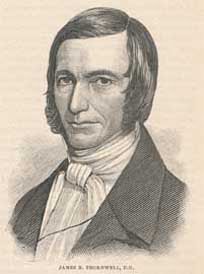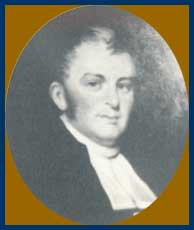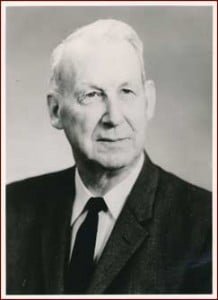Mercy Gives Rise to Atonement.
 An important sermon by the Southern Presbyterian pastor and professor, James Henley Thornwell. The text of this sermon, as originally printed, was 72 pages long and it probably took Dr. Thornwell close to two hours to deliver this message, even if speaking at a fast rate. But getting past the length of his message, there is much here that is worth your time. It may seem to start slowly, and the reading may be challenging, but Thornwell quickly gets up to speed, and the content is good, solid theology drawn directly from Scripture. [Emphasis has been added for a key point toward the end of this transcript].
An important sermon by the Southern Presbyterian pastor and professor, James Henley Thornwell. The text of this sermon, as originally printed, was 72 pages long and it probably took Dr. Thornwell close to two hours to deliver this message, even if speaking at a fast rate. But getting past the length of his message, there is much here that is worth your time. It may seem to start slowly, and the reading may be challenging, but Thornwell quickly gets up to speed, and the content is good, solid theology drawn directly from Scripture. [Emphasis has been added for a key point toward the end of this transcript].
A Sermon, preached in the Chapel of the South Carolina College, on the 1st day of December, 1844.
by James H. Thornwell, Professor of Sacred Literature and Evidences of Christianity.
Published by Request.
Columbia: Printed by Samuel Weir, at the Southern Chronicle Office, 1845.
SERMON.
Romans 1:16.
“For I am not ashamed of the Gospel of Christ; for it is the power of God unto Salvation to every one that believeth.”
The exultation and triumph with which the Apostle was accustomed to contemplate the provisions of the gospel show, that, to his mind, the scheme of redemption unfolded the perfections of the Divine character in an aspect of benignity to sinners, equally unexpected and glorious. The freshness of interest and intensity of enthusiasm, with which he habitually dwelt upon the Cross, were such as are wont to be elicited by a combination, in objects, of novelty and importance.—From it he had received full satisfaction upon questions which had awakened a deep curiosity and baffled the resources of his wisdom to resolve. A light had been reflected from the Person and Offices of Christ, which dissipated doubts that had painfully perplexed him, and revealed a prospect which might well endear to him a crucified Redeemer and change the current of his life. Discarding the refined system of licentiousness which renders the happiness of man a more important object than the moral government of God, and makes the distinctions between right and wrong mutable and arbitrary to save the guilty from despair, he assumes, in the masterly exposition, which he gives us, of the economy of grace, as the fundamental principle of his whol argument, the inseparable connection between punishment and guilt.—”The wrath of God,” he informs us, “is revealed from heaven against all ungodliness and unrighteousness of men”—”who will render to every man according to his deeds—unto them that are contentious and do not obey the truth, but obey unrighteousness, indignation and wrath, tribulation and anguish upon every soul of man that doeth evil, of the Jew first, and also of the Gentile.”
If sin be, in every instance, the object of Divine indignation; and such we perceive is the statement of the Apostle; it would seem to be impossible even for God, consistently with the perfections of His Own nature, to save the guilty from its doom. If every man must receive according to his deeds, and the wrath of God is revealed from heaven against all ungodliness and unrighteousness of men, the universality of guilt would seem to close the door upon every prospect of hope. Nature, at least, left the resources of her own strength, must always entertain distressing apprehensions, that perfection of government and the power of pardon are mutually destructive of each other, and that whatever, consequently, might be the mercy of God, He could hardly be expected to yield to its impulse at the expense of justice, holiness and truth. To those who are impressed with the magnitude of sin, the purity of God and the stern inflexibility of the divine law, the possibility of pardon is a question fraught with the profoundest interest and veiled in impenetrable gloom. It is the glory of the gospel to remove the perplexities of unaided reason, and to explain the method by which God can be just and, at the same time, justify those who are ungodly. On this account it is styled by the Apostle the power of God unto salvation. This expression he seems to have employed as an exact definition of the scheme of redemption. The gospel is not to be regarded as a simple revelation of the mercy of God and His ability to pardon; it is itself His power as a Saviour. The implication is irresistible that by the rich provisions of its grace and by them alone can the Lord deliver from going down to the pit; that, apart from the righteousness revealed to faith, Jehovah Himself, has not the power to receive the guilty into favour; that the mediation of Christ was the wonderful device of infinite wisdom to enable the Almighty, in consistency with justice, to save the lost. The phraseology of the text is a favourite mode in which the Apostle describes the mystery of the Cross. “For the preaching of the Cross,” he declares in his first Epistle to the Corinthians—”is to them that perish, foolishness, but unto us which are saved, it is the power of God. The Jews require a sign and the Greeks seek after wisdom; but we preach Christ crucified, unto the Jews a stumbling-block and unto the Greeks foolishness; but unto them which are called, both Jews and Greeks, Christ the power of God and the wisdom of God.” To the same purport is a passage in Isaiah, in which Jehovah Himself solemnly refers to the grace of the gospel as constituting His strength to save from death. The disobedient and unprofitable, addressed under the symbol of briers and thorns, are exhorted to make their peace with God and what is remarkable they are directed to do so by “taking hold of His strength.” Now as faith in the Divine Redeemer is the only means to tranquility of conscience; as there is no peace to those who are strangers to the blood of the covenant, Jehovah’s strength, is evidently the same as the atonement of His Son. There lay His power to save; and independently of that, He could only be as a devouring flame to briers and thorns. “Who wold set the briers and thorns against me in battle? I would go through them, I would burn them together; or let him take hold of my strength that he may make peace with me; and he shall make peace with me.”
The Apostle, in his Epistle to the Galatians, seems to me directly to assert, that no scheme could have been devised, independently of the work of the Son of God, by which salvation could have been effected. “If there had been a law given, which could have given life, verily, righteousness should have been by the law; but the Scripture hath concluded all under sin, that the promise by faith of Jesus Christ might be given to them that believe.” No method, in other words, could have been adopted, even in the plentitude of infinite power, by which God could acquit the guilty without the righteousness which His law demands’ and as such a righteousness is wholly impossible to human obedience, it must be secured by the mediation of a substitute. God cannot dispense with the claims of justice. His power to save is moral in its nature and cannot be exerted, cannot, in truth, be said to exist, while the law pronounces the sentence of death. The reasoning here is precisely analogous to that which succeeds the declaration of the text. The Gospel he pronounces to be the power of God unto Salvation, because “therein the righteousness of God is revealed from faith to faith; as it is written, the just shall live by faith.”
Such language must appear to those enigmatical and strange who view Christianity as little better than a republication of natural religion. Unaccustomed to the awful convictions of the malignity of sin and the holiness of God, which the enlightened understanding, through the pressure of conscience, is driven to adopt, they can perceive no difficulty in absolute forgiveness, and cannot consequently comprehend the mystery that restraints should be taken from the power of God, by the incarnation and death of the Redeemer. The necessity of the atonement, as assumed by the Apostle, is to them inexplicable jargon. The low views in which they indulge themselves, of the whole work and offices of the Saviour, are to be ascribed to imperfect apprehensions of the government of God. Their fundamental error consists in denying the need of satisfaction—in contemplating the Gospel in any other light than as “the power of God unto Salvation.” It is but a single step more, and the atonement itself is either formally discarded, or else frittered away through the subtle distinctions of philosophy and vain deceit. To appreciate aright the death and sufferings of Christ we must have a proper, if not an adequate, conception of the “needs be” into which He Himself resolved His undertaking; a needs be, which extended much farther than the fulfillment of prophecy; which had itself given rise to the predictions, in having given rise, in the depth of eternity, to the “counsel of peace.” We must enter into the meaning of the great Apostle when he measures the ability of God as a Saviour, by His power to provide a justifying righteousness.
The two great principles, on which the doctrine of atonement rests, are the inseparable connection between punishment and guilt, and the admissibility, under proper restrictions, of a surety to endure the curse of the law. The unpardonable nature of sin; the practicability of legal substitution, these are the pillars of the Christian fabric. In the first we acknowledge the indispensable necessity; in the other, the glorious possibility of an atoning Priest. In the first, we are taught the wages of sin; in the other, that they need not be reaped by ourselves. If the first were true to the exclusion of the second, eternal darkness would settle on the minds of the guilty; it is the second which opened the door of hope and furnished a field, magnificent and ample, in which God might display the resources of His wisdom and unfold the riches of His grace; be at once a just God and a Saviour.
The contemptuous confidence with which Sophists and Skeptics have denied the propriety of vicarious punishment, have evidently proceeded from the foolish apprehension that God, like ourselves, is bound to forgive upnn a confession of the fault. If these arrogant disputers of this world could be brought to feel the truth and severity of the first great principle on which the atonement has been stated to rest, they would cling to the second as the only anchor of hope; and instead of expending ingenuity in abortive efforts to undermine its strength, they would probably lay their learning under tribute to defend its fitness, while they permitted their heart to rejoice in its benignant aspect on the family of man. Let the position be firmly established that God can, by no means, clear the guilty; that sin must necessarily be punished, and all objections to the doctrine of suretyship would be given to the winds. To cling to them, under such circumstances, would be, with deliberate malice “to despise our own mercies.” The expectations of an easy pardon, secretly cherished, if not openly avowed, is the real source of pretended difficulties with “the righteousness of faith.” Hence, in discussing the doctrine of atonement, the foundations should be deeply and securely laid, in developing the Scriptural account of its necessity. Clear apprehensions upon this point would serve, at once, to define its nature, determine its extent, and put an end to cavils against its reality and truth.
The necessity of the atonement, it may be well to remark, is only the necessity of a means to an end.—The end itself, the salvation of the sinner, is, in no sense, necessary—that is the free and spontaneous purpose of Divine grace. Had all the tribes of men been permitted to sink into hopeless perdition, no violence would have been done to the nature of God, no breach been made in the integrity of His government. But the end having been determined, the death and obedience of Christ were indispensably necessary to carry it into execution : God could not receive the guilty into favor while the demands of His law were unsatisfied against them.
That the object of the atonement was to generate mercy in the Divine Being, to beget the purpose as well as the power to save, is the gratuitous caricature of those who have assailed the work, in order to deny the Divinity of the Redeemer. As well might it be pretended that the channel, which the torrent forces for itself among the rocks and declivities of the mountain, is itself the source of the impetuous current it conducts; or that the air, which daily transmits to us light and heat from the sun, is therefore the parent of these invaluable gifts. The mediation of Christ and the mercy of God are related to each other as cause and effect; but in an inverse order from that which is stated by Socinians; it is mercy that gives rise to atonement and not atonement that gives rise to mercy. The scriptural statement is: “God so loved the world, that He gave His Only-begotten Son, that whosoever believeth in Him, should not perish, but have everlasting life.” “God commendeth His love toward us, in that while we were yet sinners, Christ died for us.” “In this was manifested the love of God toward us, because that God sent His Only-begotten Son into the world, that we might live through Him. Herein is love, not that we loved God, but that He loved us, and sent His Son to be the propitation for our sins.” It was not, therefore, the design of the atonement to make God merciful–He was merciful before; it was not to generate the purpose of salvation; that had existed in the bosom of Deity from all eternity. It object was to render the exercise of mercy consistent with righteousness, to maintain the stability of the Divine throne and preserve the integrity of the Divine government, while outlaws and rebels were saved from the fate which their transgressions deserved. It is not in the nature of God to take pleasure in the death of the wicked; it is equally remote from His nature to disregard the distinctions of moral conduct and treat the wicked as the righteous. The atonement, therefore, was necessary, not, as Socinians slanderously report that we affirm, to touch the Divine Mind with compassion for the miserable; but, supposing the compassion to exist, to prepare the way by which it might be freely indulged with honour to God and safety to His Law as well as blessedness to man. The Gospel springs from mercy; and all its mysterious arrangements are only the contrivances of infinite wisdom, instigated by infinite grace, to acquire the power to save.
To continue reading this sermon, click the link below:
A Sermon, preached in the Chapel of the South Carolina College, on the 1st day of December, 1844.
by James H. Thornwell, Professor of Sacred Literature and Evidences of Christianity.
Published by Request.
Columbia: Printed by Samuel Weir, at the Southern Chronicle Office, 1845.


